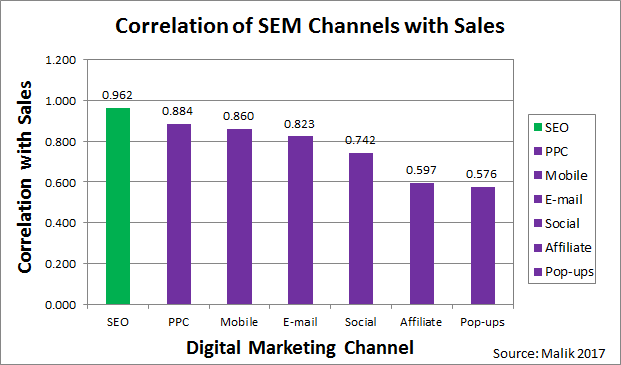Digital ad spending passed TV for the first time in 2017 (Kafka & Molla 2017). In fact, digital ads will make up 50% of all ad spending by the end of 2018, faster than expected (Berwitz 2018). With the growing penetration of digital advertising, it’s important to use the most effective online advertising channels. This article summarizes an empirical study that ranked digital advertising channels by their effectiveness on sales.
An Empirical Study of Digital Marketing and its Elements
In a 2017 study, Assistant Professor Reena Malik set out to quantify the effectiveness of the various digital marketing channels on sales (Malik 2017). Using surveys and data from 70 marketing companies Dr. Malik correlated seven digital advertising channels (SEO, PPC, e-mail, mobile, pop-ups, social media, and affiliate marketing) with sales (see Figure 1).
Professor Malik found that natural Search Engine Optimization (SEO) was the most effective SEM channel to increase sales (0.962 correlation). Pay Per Click came in second at 0.884, followed by mobile advertising (0.860), e-mail ads (0.823) and social media (0.742). Showing lower correlation were affiliate marketing (0.597) and pop-up ads (0.576).
Discussion and Caveats
This study confirms what many SEM companies have found, that natural SEO and PPC are the most effective ways to increase sales. What the study does not address is the cost effectiveness of each channel in driving leads. We’ll address this ROI aspect in a future tweak.
Conclusion
This study found that natural SEO is the most effective way to increase sales online. PPC, mobile, e-mail, and social media advertising followed in increasing sales effectiveness. While still correlating with increasing sales, affiliate marketing and pop-up advertising were the least effective SEM channels in increasing sales.
Further Reading
- An Empirical Study of Digital Marketing and its Elements
-
This study examined the relationship of digital marketing elements with sales. Using survey data from primary and secondary sources from 70 marketing compnies. this study found that all SEM channels (SEO, PPC, email ads, mobile advertising, pop-ups, social media, and affiliate marketing) correlate with sales. The digital marketing elements correlated with sales as follows: search engine optimization (.962), pay per click (.884), mobile advertising (.860), e mail advertising (.823), social media (.742), affiliate marketing (.597) and pop-up ads (.576) in that order. Natural SEO was found to be the most important digital marketing element followed by PPC advertising.
Malik, R. “International Journal of Scientific Research in Science and Technology,” Volume 3, Issue 8. 2017. - 2017 was the year digital ad spending finally beat TV
-
Global digital ad spending beat TV for the first time in 2017, according to Magna. Digital ad spending reached $209 billion worldwide — 41 percent of the market — in 2017, while TV brought in $178 billion — 35 percent of the market — in 2017.
Kafka, P & R. Molla, Dec. 2017, Recode.com. - Digital Advertising Soon to Grab 50% of All Ad Dollars
- Digital ad formats will control over 50% of all types of advertising by the end of 2018, according to Magna Global. Media owners will collect $197 billion in net advertising revenue in 2018, growing at a rate of 5.5% over 2017. Berwitz, S., March 2018, Magna Global.
- Digital Marketing in 2020: A glimpse into the future
- A survey of nearly 500 top executives found that mobile devices and personalization will have the biggest impacts on marketing in 2020. 59% of respondents predicted that mobile would have the most impact on digital marketing companies. 45% of respondents predicted that personalization technologies would have the most impact. June 2017, Allen. R. SmartInsights.com

